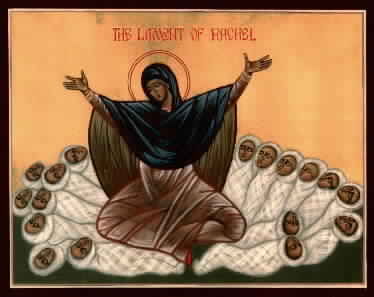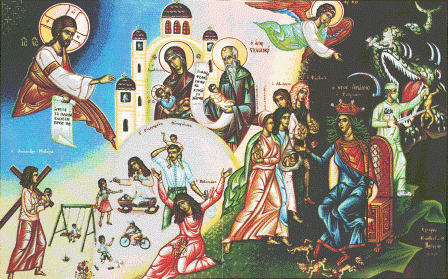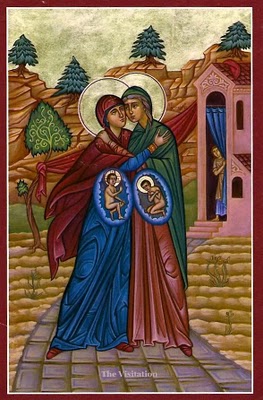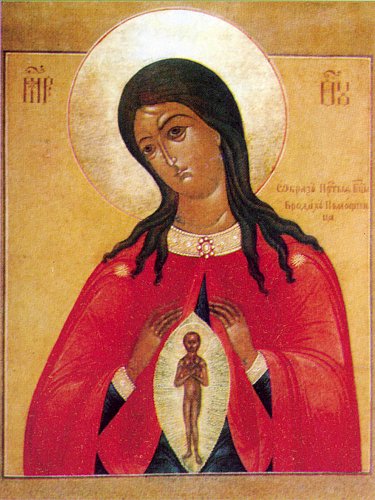I am presenting these to show the diversity in expression about abortion in Orthodox icons, but if truth be told, I have rather strict criteria for an icon that I would want to use when I write abut abortion. I think it should not be extremely innovative, or gruesome, but at the same time, should speak to the emotional horror of abortion. I think the lament of Rachel fulfills all these criteria.
I am not against “gruesome” in its proper context – no sir! Abortion is often vivisection of a living, breathing human being and I favor billboards on the road with pictures of the effect of abortion on tiny human beings, but these gruesome pictures would not serve well as a symbol.
We live in a world where people deny, deny, deny. We have a culture that does not like to think about death. There is a place for these pictures, but not in front of abortion clinics (where they could actually traumatize and anger mothers who are contemplating abortion), or as a symbol of our struggle, which is to cause healing.
Without further ado, here are some of the icons suggested, sent by perhaps a dozen responders.

The Lament of Rachel.
“Then Herod, when he saw that he was mocked of the wise men, was exceeding wroth, and sent forth, and slew all the children that were in Bethlehem, and in all the coasts thereof, from two years old and under, according to the time which he had diligently enquired of the wise men. (17) Then was fulfilled that which was spoken by Jeremy the prophet, saying, (18) In Rama was there a voice heard, lamentation, and weeping, and great mourning, Rachel weeping for her children, and would not be comforted, because they are not.” (Matthew 2:16-18 )
See also http://www.comeandseeicons.com/r/cap03.htm
I believe that this icon was commissioned by Zoe for Life

The Horror of Abortion.
See an Explanation of this icon here: http://www.orthodoxchristian.info/pages/abortion3.html
Any good symbol is simple, and there is just too much going on in this icon. Of course, it is not traditional in many ways, but it tells the truth.

The Theotokos and Anna embracing.
“And Mary arose in those days, and went into the hill country with haste, into a city of Juda; (40) And entered into the house of Zacharias, and saluted Elisabeth. (41) And it came to pass, that, when Elisabeth heard the salutation of Mary, the babe leaped in her womb; and Elisabeth was filled with the Holy Ghost: (42) And she spake out with a loud voice, and said, Blessed art thou among women, and blessed is the fruit of thy womb. (43) And whence is this to me, that the mother of my Lord should come to me?” (Luke 1:39-43)
I like this icon, although it may be a tad innovative, but it does not capture the emotion of the loss involved in abortion as the Lament of Rachel does.
See also: http://byztex.blogspot.com/2010/03/annunciation-and-abortion.html

Christ the Author of Life.
I dunno, just does not grab me, and is a little too innovative for me. It certainly makes a statement though!

"Help in Birth-giving" Icon, commemorated on 26 December / 8 January.
The Life:
"From time immemorial, it has been known that in moments of the most intense suffering of the birthing process, women run with especially fervent prayer to the Savior and to His Most-pure Mother. In our time as well, pious families keep copies of the Icon of the Mother of God known as the “Help in Birth-giving” Icon. In this Icon, the Most-pure Virgin is depicted full-length, standing with hands upraised, and with the Babe in her arms, as in the “Sign” Icon. Mothers bow down before this Icon, calling in fervent prayer upon the assistance of the Most-blessed Virgin Mary, the one who had painlessly given birth to Christ the Savior. They call out to her in a mother’s awesome, uniquely mysterious and secret moment, in the belief that she is a strong intercessor and helper before God for all who suffer and are heavy-laden. And who, running to the Queen of Heaven, can come away without being comforted by her in times of sorrow and ills?! Her almighty intercession brings a solution to all the illnesses and sufferings from which no earthly power or earthly riches could save us.
There is another very ancient Icon, known as the “Icon of the Most-holy Theotokos, helper to women giving birth to children.” On that Icon, the Mother of God is depicted with head uncovered, her hair flowing down her shoulders, and her arms folded upon her breast. The fingers of the left hand partially cover the fingers of the right. Below the level of her wrists sits the Divine Infant, the fingers of His right hand forming the acronym of His Name (ICXC), and the left resting upon His knee. His feet protrude from below the hem of his garments. The Theotokos’ outer garment is red and gold, with a gold star on each shoulder. Her inner garment is dark green, with flashes of gold and with gold stars, and the same kind of trim on her collar and cuffs. The Theotokos’ head inclines slightly. The Savior’s clothing is yellow and gold, blending on his chest into a dark green color. The entire composition is written on a semi-circle."
Icon courtesy of http://www.pravoslavie.ru. Life from http://www.stjohndc.org
There were a few more icons suggested, such as Our Lady of Guadeloupe, and the Annunciation, and I may be forgetting a couple others, but you get the idea.
Priest Seraphim Holland 2011 St Nicholas Russian Orthodox Church, McKinney, Texas
This article is at:
http://www.orthodox.net/journal/2011-10-11-orthodox-icons-related-to-abortion.html
http://www.orthodox.net/journal/2011-10-11-orthodox-icons-related-to-abortion.doc
New Journal entries, homilies, etc. are on our BLOG: http://www.orthodox.net/redeemingthetime
Journal Archive: http://www.orthodox.net/journal
Blog posts & local parish news are posted to our email list. Go to here: http://groups.google.com/group/saint-nicholas-orthodox-church to join.
Redeeming the Time BLOG: http://www.orthodox.net/redeemingthetime
Use this for any edifying reason, but please give credit, and include the URL of the article. This content belongs to the author. We would love to hear from you with comments! (seraphim@orthodox.net)
Fr Bless!
Dear Father in Christ Seraphim
With regards to the abortion icon above that you have attributed to Zoe for Life, I can confirm that it was commissioned by Bishop Joseph of Arianzos, then of the Greek Orthodox Archdiocese of Australia. This is described at our website at http://www.orthodoxchristian.info/pages/abortion.htm
Yours in Christ,
John Grapsas
webmaster@orthodoxchristian.info
If you go to St. Maximus in Denton there's a large icon of the Lament of Rachel I had made for pro-life marches. It made quite an impression.
The "obscure" icon without a name is the "Help in Birth-giving" Icon, commemorated on 26 December / 8 January. It's available on the St. John's website under this date in the "Icons of the Mother of God" section (see sidebar).
The Life:
"From time immemorial, it has been known that in moments of the most intense suffering of the birthing process, women run with especially fervent prayer to the Savior and to His Most-pure Mother. In our time as well, pious families keep copies of the Icon of the Mother of God known as the “Help in Birth-giving” Icon. In this Icon, the Most-pure Virgin is depicted full-length, standing with hands upraised, and with the Babe in her arms, as in the “Sign” Icon. Mothers bow down before this Icon, calling in fervent prayer upon the assistance of the Most-blessed Virgin Mary, the one who had painlessly given birth to Christ the Savior. They call out to her in a mother’s awesome, uniquely mysterious and secret moment, in the belief that she is a strong intercessor and helper before God for all who suffer and are heavy-laden. And who, running to the Queen of Heaven, can come away without being comforted by her in times of sorrow and ills?! Her almighty intercession brings a solution to all the illnesses and sufferings from which no earthly power or earthly riches could save us.
There is another very ancient Icon, known as the “Icon of the Most-holy Theotokos, helper to women giving birth to children.” On that Icon, the Mother of God is depicted with head uncovered, her hair flowing down her shoulders, and her arms folded upon her breast. The fingers of the left hand partially cover the fingers of the right. Below the level of her wrists sits the Divine Infant, the fingers of His right hand forming the acronym of His Name (ICXC), and the left resting upon His knee. His feet protrude from below the hem of his garments. The Theotokos’ outer garment is red and gold, with a gold star on each shoulder. Her inner garment is dark green, with flashes of gold and with gold stars, and the same kind of trim on her collar and cuffs. The Theotokos’ head inclines slightly. The Savior’s clothing is yellow and gold, blending on his chest into a dark green color. The entire composition is written on a semi-circle."
The icon in question was posted courtesy of http://www.pravoslavie.ru.